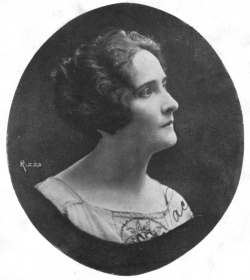

Queer Places:
Cemitério São João Baptista, R. Gen. Polidoro - Botafogo, Rio de Janeiro - RJ, 22281-033, Brazil
 Maria
Lacerda de Moura (16 May 1887 – 20 March 1945) was a Brazilian
anarcho-feminist, individualist anarchist, teacher, journalist, and
writer.[1]
Maria
Lacerda de Moura (16 May 1887 – 20 March 1945) was a Brazilian
anarcho-feminist, individualist anarchist, teacher, journalist, and
writer.[1]
She was born on the Monte Alverne farm in Manhuaçu, Minas Gerais, Brazil on 16 May 1887. "She was the daughter of Modesto de Araújo Lacerda and Amélia de Araújo Lacerda, freethinkers and educated folk from whom she certainly inherited her strong anticlerical outlook".[1]
"Five years after she was born they moved to Barbacena, Minas Gerais, Brazil, the town where she started her schooling and by the age of 16 she was training as a primary teacher, the profession to which she was deeply committed."[1] One year later she married Carlos Ferreira de Moura.[1]
As a teacher and a pedagogue in Barbacena she founded the League Against Illiteracy and worked with other women to help provide housing for the homeless. Her ideas regarding education were largely influenced by Francisco Ferrer. Moura used Albert Einstein and Mahatma Gandhi as examples of pacifism in her essay "Serviço militar obrigatório para mulher? Recuso-me! Denuncío!"
She later moved to São Paulo and became involved in journalism for the anarchist and labor press. "Among the labour papers she wrote for were O Culinário Paulista, A Patrulha Operária, A Plebe, A Lanterna and O Trabalhador Gráfico."[1] "At that time of great social upheaval she started to give lectures (some in the city of Santos) to trade unions, cultural centres, anarchist theatre groups and labour associations and the likes of the Printing Workers’ Union, the Anticlerical League and the Union of Footwear Crafts. She also started to write for the anarchist press, among it the newspaper A Plebe where she wrote about ‘the underlying and ancillary sciences of education and educational psychology’ carrying on and adding to the work done in that field by Neno Vasco with the weekly newspaper A Terra Livre in 1906."[1]
There she also lectured on topics including education, women's rights, free love, and antimilitarism. Her writings and essays landed her attention not only in Brazil, but also in Argentina and Uruguay. "In 1918 she began her career as a writer, issuing her first book On Education. Such was the impact it made that the following year she published two follow-ups Why Does the Future Triumph?."[1] In February 1923 she launched Renascença,, a periodical linked with the anarchist, progressive, and freethinking circles of the period.
"At around the same time she helped to found the International Women’s Federation and the Women’s Anti-war Committee, based in São Paulo."[1] "In February 1923 she launched the monthly review Renascença which made no bones about spreading libertarian feminist ideas and dealing with other social issues. This review was circulated in nine states of Brazil as well as in Argentina and Portugal. The following year she issued her most famous book Is Woman Degenerate? by way of an outraged retort to the thesis ‘Epilepsy and pseudo-epilepsy’ written by the psychiatrist Miguel Bombarda in which he tried to show through pseudo-scientific case studies that woman was man’s biological inferior. In 1926 she issued another class work: The Religion of Love and Beauty. "Due to her great popularity in countries such as Uruguay, Argentina, Chile and Mexico she was invited to give talks in Montevideo, Buenos Aires and Santiago."[1] In 1931 she issued two more books, "Clergy and State and Civilisation – Body of Slaves". In 1932 she published yet another outstanding book, "Love … and Do Not Multiply."[1]
Her thought was mainly influenced by individualist anarchists such as Han Ryner and Emile Armand.[2] On Han Ryner she wrote "Han Ryner e o amor plural (1928)". Maria Lacerda de Moura died at Rio de Janeiro in March 1945.
My published books: